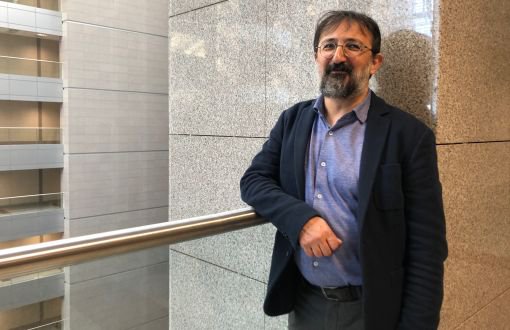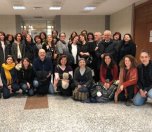Click to read the statement in Turkish
We are publishing the statement of Prof. Dr. Sefa Feza Arslan from Mimar Sinan Fine Arts University (MSGSÜ), who has been charged with "propagandizing for a terrorist organization" for having signed the declaration entitled "We will not be a party to this crime" prepared by the Academics for Peace and had his second hearing at the İstanbul 23rd Heavy Penal Court in İstanbul Çağlayan Courthouse on March 5, 2019.
(Click here to read statements of Academics for Peace published in English)
***
Your honors,
As a peace defender, I am ready to be judged with the accusation of "defending peace", but I want to first of all state that it is demeaning for me to be accused of making "terrorist propaganda". As a pacifist, who even refuses to buy toy guns for his child, it is impossible for me to accept this accusation. I reject all of these illogical accusations.
Pacifism is a theory and a form of action that rejects all types of violence and terror and the use of weapons. Pacifism promotes peaceful and nonviolent solutions to problems and conflicts.
I believe Onat Kutlar's words summarize the ethical base of pacifism clearly: "Every time a human being is killed, a universe is annihilated. No holy ideal, no ideology, no anger, no power justifies killing."
One of the very simple and reasonable arguments that makes pacifism a powerful philosophy can be found in the words of the great Roman thinker Cicero, although he was not a pacifist himself: 'It (peace) may be on unjust terms, but even so it is more expedient than the justest of civil wars.'
If we think about the disasters and violations of human rights that wars and conflicts cause, it is quite difficult to refute this argument.
However, whenever a war or a conflict starts, the virtues of peace are forgotten and the voice of the nonviolent people who call for peace are muted by the voice of weapons. Hence, the times when real love of peace is tested are not the times of peace, but the times of war.
The text "We will not be a party to this crime", which is considered as the reason of our judgement arose in such a time of conflict as a scream for peace. It is a completely nonviolent text, demanding to "create a road map that would lead to a lasting peace" to prevent the death of civilians and non-civilians, and to prevent people from having more agonies.
From socialists to social democrats, from conservatives to Kemalists, from liberals to communists, the only thing that the petitioners have in common is their love of peace.
Some of them signed the petition by remembering the words of a poet: "If the mountains, people and even death is tired, the most beatiful poem is now peace." Others signed it by stating "Peace at home, peace in the world" and some others signed it by saying "Whoever kills one person kills humanity". This heterogeneous nature of the collective of the petitioners is itself sufficient to refute the indictment.
Neither an ideology, nor a central organization can bring together all these people of different identities. The only power that can gather together all these academics with such different worldviews is their conscience: A conscientious act against violation of human rights and calling for peace as an emergency solution.
This indictment not only considers mentioning the violation of human rights as defaming the state, but also causes us to be judged by a logically incorrect argument:
"By defaming the state of Republic of Turkey, the government, the judicial system, the army and police forces, they made propaganda for the armed terror organization PKK/KCK in a way to legitimize the methods of violence or promote them."
The reason for me to choose this claim [as the focus of my refutation] is that it is the only argument in the indictment to justify the accusation of "legitimization and promotion of violence."
Hermann Weyl says, "Logic is the hygiene the mathematician practices to keep his ideas healthy and strong." In fact, this is also true for the fraternal discipline: law. Now, let us analyze the logical implication, in this argument and see why it is wrong.
If we simplify, this proposition in the indictment states that, "If one defames army and police forces, then he/she legitimizes and promotes violence." However, this proposition is completely wrong.
In my opinion, the indictment here considers the proposition "If one legitimizes and promotes violence, then he/she defames the army and police forces" to be equivalent to the proposition, "If one defames the army and police forces, then he/she legitimizes and promotes violence." The indictment claims that the latter proposition is true by considering the former as true.
But, you also know very well that "p implies q" and "q implies p" are not equivalent. This is one of the basic rules of logic, which is the hygiene of not only mathematics, but also of law.
As a result, even if you claim that the petition defames the army and police forces, this does not imply the legitimization of any organization or the promotion of violence. I also want to state that my colleagues have already presented the reports of many national and international human rights organizations, which document the violation of human rights cases.
I think this petition is a textbook example of the typical use of the right of freedom of expression. A group of academics criticizes the violation of human rights, calls for peace as an emergency solution and expresses a completely pacifist and nonviolent opinion by stating that Kurdish question cannot be solved by violence but by negotiation.
This is nothing but the use of the right of freedom of expression in the Constitution: "Everyone has the right to express and disseminate his/her thoughts and opinions by speech, in writing or in pictures or through other media, individually or collectively."
This right is guaranteed not only by the Constitution, but also protected under the Universal Declaration of Human Rights signed by the Republic of Turkey on April 6, 1949 ("Everyone has the right to freedom of opinion and expression; this right includes freedom to hold opinions without interference and to seek, receive and impart information and ideas through any media and regardless of frontiers.") and under the European Convention on Human Rights signed by the Republic of Turkey on March 10, 1954. ("This right shall include freedom to hold opinions and to receive and impart information and ideas without interference by public authority and regardless of frontiers.")
For us, mathematicians, our foundation is the axioms, while we are doing mathematics. These are the statements that are considered to be true.
For the judges and prosecutors, this foundation is the Constitution and the international agreements. Since a mathematical theorem cannot contradict the axioms, a judicial decision should not contradict the Constitution and the international agreements.
Being punished for being a peace petitioner is obviously in contradiction with the Constitution and also the international agreements..
The history of humanity shows that the societies that restrict the freedom of expression cannot progress. On the other hand, the societies that promote the freedom of thought and expression make great contributions to civilization. I want to give an example as a mathematician.
Why did the mathematics that we do arise in Ionia during the period 600-300 B.C.? It was not possible for philosophy, mathematics and the concept of proof to arise in an authoritarian, theocratic or monarchic regime. They arose in a place, where there was unlimited questioning, and different schools of thought could discuss freely in the public sphere.
Moreover, the golden age of Islamic civilization also arose in a similar atmosphere, in which different schools of thoughts interpreted freely the Islamic texts. Whenever "the gates of ijtihad" are closed, in other words the free interpretation of Islamic texts is banned and freedom of thought and expression are restricted, the Islamic civilization begins to decline.
What makes a university a university is creating and ensuring the free atmosphere in which philosophy, mathematics and the concept of proof arose. This is the reason why a university should be autonomous and academic freedom is the sine qua non of a university.
Everything can be discussed and criticized in a university. It is not a coincidence that the petition text "We will not be a party to this crime" came out of the universities. The academics criticize the policies of the governments harshly, and those critics should not result with indictments in democratic countries. For example, Noam Chomsky says US is world's biggest terrorist in one of his interviews [1].
In 2000, after a photo of Edward Said throwing a stone as a symbolic act in the Israel border was in the press, some people demanded that he should be punished by the university. I want to finish my defense by the words of the provost of Columbia University, Jonathan R. Cole, who responded to those people who called for punishment [2]:
"If this current episode were in fact about throwing a stone across a border that apparently did not threaten anyone, we might leave it at that. But this discussion is really about something more basic to the University's fabric than the tossing of a stone since, it seems to me, if it were not for Professor Said's well-known political views this would not have become a matter of heated and on-going debate. This matter cuts to the heart of what are fundamental values at a great University.
There is nothing more fundamental to a university than the protection of the free discourse of individuals who should feel free to express their views without fear of the chilling effect of a politically dominant ideology. John Stuart Mill in his wonderful essay, On Liberty, eloquently discusses why it is so important to the concept of liberty for us to support the expression of unpopular ideas that may offend or appear to threaten one's own views:
'If all of mankind minus one were of one opinion, mankind would be no more justified in silencing that one person than he, if he had the power, would be justified in silencing mankind...' (SFA/SD)
-
[1] https://www.euronews.com/2015/04/17/chomsky-says-us-is-world-s-biggest-terrorist
[2] https://www.columbiaspectator.com/2000/07/19/edward-said-accused-stoning-south-lebanon/





